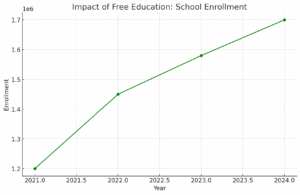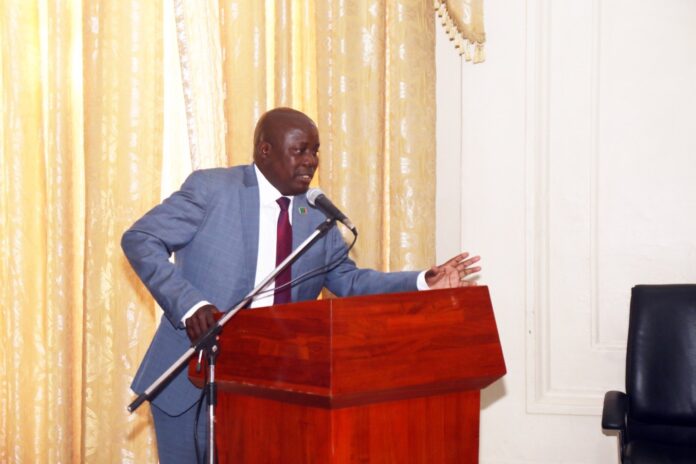Presidential Praise Not a Priority: Hamasaka Urges Focus Amid Opposition Criticism
Clayson Hamasaka, a senior government official, has pushed back against sustained criticism from Zambia’s opposition, stating that the ruling party remains undeterred by political attacks and is focused on delivering national development. He argued that achievements such as free education and new mine openings speak for themselves, even in the absence of praise from opponents.
In a political climate often defined by opposition criticism and ruling party defense, Hamasaka’s comments underscore the growing chasm between Zambia’s major political blocs. “You do not expect the opposition to praise the president,” he said. “Actually, they are condemning free education. They say we have compromised education quality.”
This dynamic, he argues, reveals a contradiction: programs that directly benefit citizens are being politicized rather than debated constructively. “If they are going to condemn free education, are they going to remove it?” he asked. “If they are condemning us for opening mines, what is their alternative?”
Hamasaka’s statements come as the government defends several high-profile reforms, including universal primary and secondary education, economic stabilization efforts, and the revival of key mining operations. While these initiatives have garnered support from international donors and development partners, the opposition has remained largely critical, arguing that implementation lacks quality, oversight, or sustainability.
Analysts say the polarized rhetoric reflects deeper systemic issues. “In Zambia, opposition tends to define itself by confrontation rather than policy alternatives,” says Dr. Loveness Silungwe, a political scientist at the University of Zambia. “This impedes constructive democratic discourse and keeps voters in a cycle of confusion and cynicism.”
The introduction of free education in 2022 was one of President Hakainde Hichilema’s landmark pledges. It aimed to eliminate school fees for primary and secondary education, thereby improving access for children from low-income families. Despite its positive impact, critics argue the policy has stretched teaching resources and compromised classroom quality.
Government officials maintain that the challenges are transitional. “Yes, there are issues, but it’s a bold step towards equitable development,” said Education Minister Douglas Syakalima during a recent press briefing. He pointed to record enrollment numbers as evidence of success.
Zambia, a major copper producer, is also working to revive stalled or underperforming mines to boost production and foreign earnings. Hamasaka sees this as a key success under the current administration, even as the opposition questions ownership structures, licensing transparency, and labor conditions.
“We’ve created jobs and increased investor confidence,” Hamasaka stressed. “But all the opposition sees is an opportunity to discredit our efforts.”
Experts argue that while skepticism is a healthy component of democracy, it must be matched by solutions. “It’s not enough to say the government is failing,” said governance expert Choolwe Mweetwa. “The opposition must offer clear policy alternative show they would do things better, not just differently.”
The current tone of political debate, marked by accusations and defensiveness, risks alienating voters who seek pragmatic leadership over rhetorical battles.
Hamasaka’s message is clear: the ruling party does not expect applause from its opponents, but it demands fair critique rooted in facts and national interest. As Zambia heads into another election cycle, the maturity of its democracy will hinge not on applause or antagonism, but on the quality and integrity of its public debate.

“Impact of Free Education Policy: Enrollment Before and After (2021–2024)”



A survey which I am told is yet to be published says 90% of the people who voted for the current government did not even vote for it on account of free education. Infact we are told that as much as 95% of the respondents said they were not even aware or did not even recall of the free education campaign when they were voting. Instead respondents said they voted for K50 mealie meal, K12 fuel, K250 fertiliser and an ending to loadsheding. So sometimes when praising yourselves it would be good to check yourselves, because you could be self praising yourselves but completely detached from reality.
Hamasaka is supposed to be a trained media practitioner who has spent the better part of his career teaching journalism at Evelyn Hone. Am I the only one who feels he doesn’t know the role of a presidential spokesperson?
His job ought to clarify government policy at State House level. Attacking and responding to opposition surely?
Also, where on earth is the praise loving President during this national mourning? It speaks volumes he didn’t make the announcement and even the declared national mourning came from P Kangwa.
That is the level we have dropped to. He is not the only one who has no clue of his role in this govt. Look at the circus at permanent secretary level at MOI. It is sad.
What Hamasaka is doing at State House is duping the nation. Nation gives him a salary to do a government job he goes to State House to attack the opposition! He uses our money to keep UPND in power. Most Zambian politicians have failed to grasp the difference between their party and the government mostly because their boss the president who is being illegally defended is happy to have soldiers that he goesnt pay for from his pocket. Wake up Zambians we are being duped! We dumped the Second republic!!
Uncle Spider you arent the only one who feels he doesn’t know the role of a presidential spokesperson Most presidential aids in this position prefer to misunderstand their role because no president who can see you firing your unlicensed guns at his enemies(the opposition) will stop you.
In short presidents are weak and cant walk the ethical path. Thats why they end up with press aids who think they are presidents. The UPND just recently re-hired one.
Kikikikikiki you know who Im talking about? Yes the president’s media adviser’s job carries a hidden job description: Attacking and responding to opposition.
Though they say you don’t go to church because of an individual, I am not ashamed to say my family and I are leaving his church. You cannot have somebody again self praising himself that he is a church elder but treating others in such an inhumane manner. Infact the least I expected was his church to excommunicate him. We are all made in the image of God. We are told to love one another. We are told of no vengeance. The man could probably have been alive if compassion was shown. Despite all this, I still pray for unity and love in our country
I know HH is not dull, and maybe by now he has already reflected. But remember you have people like Hamasaka or Matambo or Mwaliteta who will always mislead him. Guys, you did not handle your friends affairs well. Be sympathetic, and though we know you are die hards with kufwa na no, just apologise, we move on. And reinstate or compensate the guy you fired at the airport who did not search ECL. This is not a political post
How does a mere civil servant start thinking he can start sermonising to the entire nation on politics? Who voted him into power? We vote for a President! We dont vote for his aids! They must not take a ride on the Presidency we voted for and start using it for their own platform of political mumbo jumbo!!
Comments are closed.